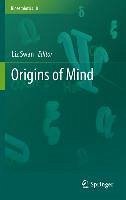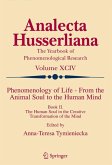The big question of how and why mindedness evolved necessitates collaborative, multidisciplinary investigation. Biosemiotics provides a new conceptual space that attracts a multitude of thinkers in the biological and cognitive sciences and the humanities who recognize continuity in the biosphere from the simplest to the most complex organisms, and who are united in the project of trying to account for even language and human consciousness in this comprehensive picture of life. What philosophers of mind and cognitive scientists can contribute to the growing interdiscipline are insights into how the biosemiotic weltanschauung applies to complex organisms like humans where such signs and sign processes constitute human society and culture.
The purpose of this volume is to gather together a sampling of contemporary thinking on when, why, and how mindedness evolved in the natural world from researchers working in the biological, cognitive, and medical sciences. The question of the origin of mind is no longer the exclusive domain of philosophers; it has, in recent decades, become a respectable question for research scientists to work on as well.
The volume's contents are pluralistic. One element that most of the chapters in the volume have in common is in their adherence to the principle that the phenomenon of mindedness, including the peculiarities of human mindedness, is a biological phenomenon. Fully represented in this volume are thoughts, ideas, and theories that contribute to our naturalistic understanding of mindedness that address its biological origins and evolutionary development. The volume is divided into five sections devoted to the sub-topics of: biosemiotics theories of mindedness, the evolution of mental representation in humans, the evolution of various aspects of consciousness, problems in philosophy of mind, and simulation approaches to understanding human intelligence.
The purpose of this volume is to gather together a sampling of contemporary thinking on when, why, and how mindedness evolved in the natural world from researchers working in the biological, cognitive, and medical sciences. The question of the origin of mind is no longer the exclusive domain of philosophers; it has, in recent decades, become a respectable question for research scientists to work on as well.
The volume's contents are pluralistic. One element that most of the chapters in the volume have in common is in their adherence to the principle that the phenomenon of mindedness, including the peculiarities of human mindedness, is a biological phenomenon. Fully represented in this volume are thoughts, ideas, and theories that contribute to our naturalistic understanding of mindedness that address its biological origins and evolutionary development. The volume is divided into five sections devoted to the sub-topics of: biosemiotics theories of mindedness, the evolution of mental representation in humans, the evolution of various aspects of consciousness, problems in philosophy of mind, and simulation approaches to understanding human intelligence.
Dieser Download kann aus rechtlichen Gründen nur mit Rechnungsadresse in A, B, BG, CY, CZ, D, DK, EW, E, FIN, F, GR, HR, H, IRL, I, LT, L, LR, M, NL, PL, P, R, S, SLO, SK ausgeliefert werden.
"The chapters provide one of the best explorations of mind-as-process in an age where only empirical phenomena exist, i.e., where there are no extra-empirical things (naturalism). This wide-ranging exploration of an increasingly influential approach to understanding the meaning of 'mind' will interest philosophers, psychologists, neuroscientists, and cognitive scientists. Summing Up: Highly recommended. Upper-division undergraduates and above." -- (R. Paul Thompson, Choice, Vol. 50 (11), August, 2013)
From the reviews:
"The chapters provide one of the best explorations of mind-as-process in an age where only empirical phenomena exist, i.e., where there are no extra-empirical things (naturalism). This wide-ranging exploration of an increasingly influential approach to understanding the meaning of 'mind' will interest philosophers, psychologists, neuroscientists, and cognitive scientists. Summing Up: Highly recommended. Upper-division undergraduates and above." (R. Paul Thompson, Choice, Vol. 50 (11), August, 2013)
"The chapters provide one of the best explorations of mind-as-process in an age where only empirical phenomena exist, i.e., where there are no extra-empirical things (naturalism). This wide-ranging exploration of an increasingly influential approach to understanding the meaning of 'mind' will interest philosophers, psychologists, neuroscientists, and cognitive scientists. Summing Up: Highly recommended. Upper-division undergraduates and above." (R. Paul Thompson, Choice, Vol. 50 (11), August, 2013)









